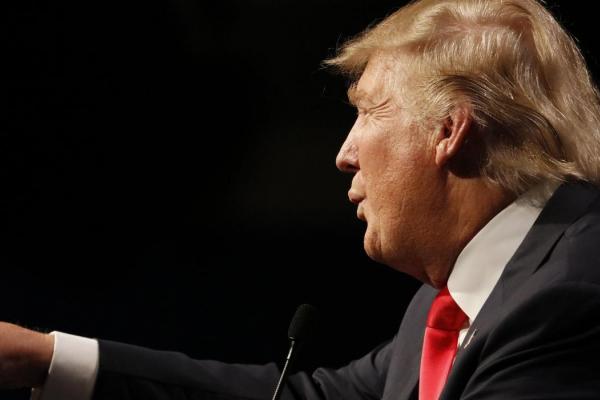“The ultimate tragedy is not the oppression and cruelty by the bad people but the silence over that by the good people.”-Martin Luther King Jr.
This week at Liberty University, Donald Trump was given a platform to address evangelicals. Much has been written on why Donald Trump may be unqualified to be speaking on a day where we celebrate the lasting impact of Martin Luther King Jr.’s fight against oppression. His policy proposals include mass deportations, barring Muslims from traveling to the United States, and creating a registry to monitor Muslims in America. Lending legitimacy to his xenophobic rhetoric is entirely contradictory to the life and mission of Martin Luther King Jr.
There is something to be learned from the convocation, namely how not to interact with the political.
Jesus had an extraordinary sense of humility about him. The God-man chose to come into the world in humble circumstances. He is the model of the self-sacrificial ethic for all Christians. He affirms this in Matthew 20:28 (NRSV) saying, “just as the Son of Man did not come to be served, but to serve, and to give his life as a ransom or many.”
Paul illustrates this in the beautiful hymn of kenosis in Philippians 2. Christ “made himself nothing by taking the very nature of servant, being made in human likeness. And being found in appearance as a man, he humbled himself by becoming obedient to death — even death on a cross!”
This is the template for Christian ethics in every aspect of life: interaction with family, performing vocation, and engagement with the political. This ethic needs to influence both the posture Christians take when discussing politics and the types of policies they support.
This week at Liberty University, Donald Trump demonstrated to the evangelical community the opposite of Christ’s ethical model.
“I will worship you,” the band sang. “I will worship you, you give me life, life to my soul.” It was a strange moment of cognitive dissonance which begs the question: How do Trump’s policies and rhetoric reflect the principles of the Christian faith?
A lot of different themes can be explored but there are three that are important based on his speech:
1) Personal narcissism is based on success measured by worldly metrics.
In Donald Trump’s world, the only thing that matters is “winning.” He said, “[Americans] want to see win, win, win!” To people like Trump, the way people “win” is through shows of force, whether they be physical or economic.
This is not consistent with a Christian worldview. Instead, the precedent is set by the Christ and the many faithful saints who came after him who sacrifice themselves to advance the Gospel.
If Christ really is the model, then our endpoint should be his endpoint. C.S. Lewis understood this by claiming, “When God becomes a Man and lives as a creature among His own creatures in Palestine, then indeed His life is one of supreme self-sacrifice and leads to Calvary.”
A Christian ethic cannot do anything except embrace the humility of Christ which takes them to Calvary. This is contradictory to the message of “winning” preached by Donald Trump.
2) Evangelicals are a voting block to Trump.
One of his may brags at Liberty was that he is doing “very well” among evangelicals in the polls. This might be true; however, the way he groups the evangelical with other demographics is problematic for a few reasons.
First, evangelicalism is not monolithic. There are many different sub-groups making up the category. When these differences are papered over, it doesn’t allow for dissenting voices.
Second, the way he speaks about the evangelical voting block makes Christianity a commodity, which helps him win an election. True Christianity is a deep encounter with Reality. It can’t be reduced to a chip that helps politicians win elections. When this is allowed, the radical message of the Gospel gets co-opted.
3) Trump puts faith in the military industrial complex.
“I want a general who will knock the hell out of them,” Trump claimed during his speech. This (along with many of his policy proposals) reflects a worldview that seeks to securitize as much as possible. Glorifying this perspective is especially grievous on Martin Luther King Day. Securitization makes us view the world differently than we should as Christians.
When we securitize, we begin to see the world only as potential threats. The dichotomy of “us” against “them” is created and people are methodically placed in one of those two categories.
The drive for security is not satisfied to be sectioned off or moderated because responsible limits become threats. It’s an ever expanding need and in the minds of those who advocate for it, it requires increasingly drastic actions to satisfy it — actions like wanting to ban all Muslims from coming to America or creating databases to monitor people based on their religion.
The real problem for the Christian is that this process of securitization dehumanizes and devalues people deemed as threats rather than seeing every person as someone Christ died for.
This is why Jesus deconstructs the very category of “enemy” In Matthew 5:44 (NRSV), he urges his followers, “But I say to you, Love your enemies and pray for those who persecute you.”
I agree with Jerry Falwell Jr., when he quotes Matthew 7:16. “You will know them by their fruit.”
Got something to say about what you're reading? We value your feedback!

